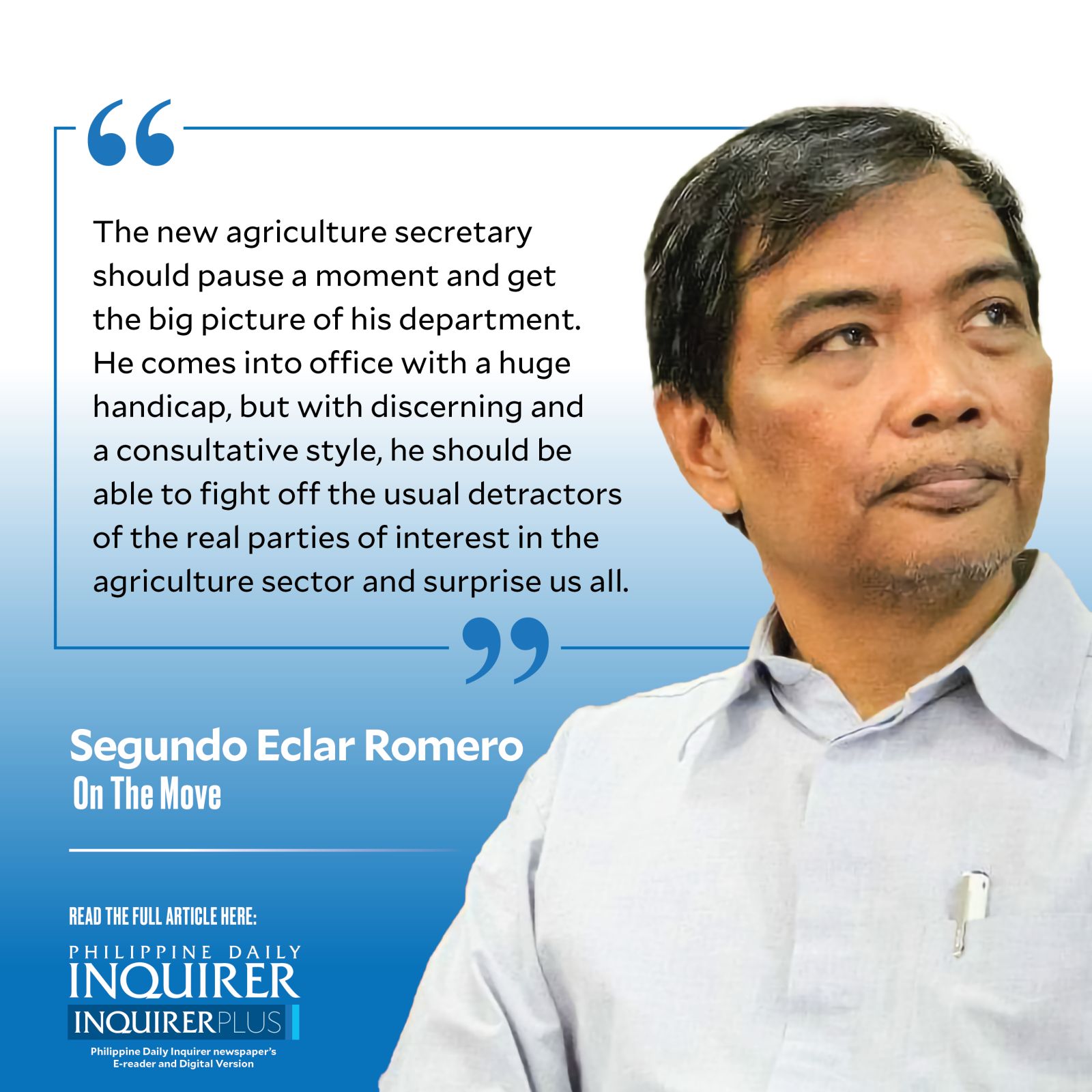Challenges of being agriculture secretary

It made sense for President Marcos to become the secretary of agriculture if the premise was for him to use the powers and influence of the presidency to quickly repair the broken policy infrastructure of agriculture. What needed to be done? The primary task was to restore to the agriculture sector the financial, infrastructural, and extension support that was envisioned by the Marcos Sr. “New Society.”
But Mr. Marcos did nothing of the kind, except to enunciate populist promises like the P20 per kilo rice that is no longer within reach, now and forever. It was a classic case of short-sightedness and policy indolence — tweaking the value chain at the point of sale, not at the point of production.
Mr. Marcos’ tagline as agricultural secretary was “Agriculture is going to be a critical and fundamental part of our economic transformation.” Comfortingly, this was a mere declaration, not a presidential commitment.
So now Mr. Marcos unceremoniously exits the position, after his popularity lost by several points due to the unfulfilled promises relating to increasing inflation, with the price of rice being the flagship indicator.
The best the President could do was to get a full-time secretary that was fit for purpose. Doing this for a complicated sector that was already skipping from crisis to crisis is difficult, but it could be done. But it requires a series of multistakeholder consultations not only to inventory and raise the myriad issues, but also to have a sense of a policy and programmatic roadmap. This process could also serve as a forum for identifying those sterling individuals who could possibly serve as the champion of synergized initiatives to clamber out of the doldrums in the sector.
The appointment of Francisco Tiu Laurel Jr. as agriculture secretary by Mr. Marcos last week raised some questions about the soundness of the appointment. This, in turn, raised questions on the context and circumstances of the appointment, and the criteria for evaluating the appointment.
An agriculture secretary is the chief implementor of the agricultural policy of the nation. It is clear that this policy needs urgent and comprehensive updating and reinterpretation, in view of the various volatile trends in agriculture, fisheries, and overall food security in the Philippines as it emerged from the pandemic and the lackluster performance of Mr. Marcos as stand-in secretary of agriculture.
A crucial structural reform is the reinstatement of the extension services to farmers and fisherfolk that were drastically reduced due to the Local Government Code of 1991. Without adequate devolved funding, systems, and staff, provinces and municipalities did not give extension services the high priority they merited. Most farmers and fisherfolk no longer experience extension programs on a first-hand basis.
An incoming agriculture secretary, even if appointed a year and a half ago, will not have had the normal amount of time to deal with the regular tasks of a normal secretary of agriculture given these heightened challenges compounded by the backlog of unresolved post-pandemic issues. This requires building and harnessing a multisectoral policy and implementation surge force to work on the sector.
An incoming agriculture secretary will have to familiarize himself with the key staff of the department, which would at minimum consist of undersecretaries, assistant secretaries, bureau directors, regional directors, program directors, and key special directors.
He will have to familiarize himself with the logic, framework, breadth, and depth of the myriad programs, projects, and activities of the department, and match these with the locations and offices, facilities, systems and procedures, and geographic, demographic, and sociocultural contexts of the relevant stakeholders.
He has to know the various stakeholder groups in the public sector, the private sector, the civil society sector, and the 14 basic sectors whose well-being is directly and indirectly impacted by the agriculture policies and programs of the government, and whose interests are structurally diametrically divergent from one another.
The main challenge for the agriculture secretary is to be an effective champion of the farmers and fisherfolk in the country. The new secretary should pause a moment and get the big picture of his department. He comes into office with a huge handicap, but with discerning and a consultative style, he should be able to fight off the usual detractors of the real parties of interest in the agriculture sector and surprise us all.




















